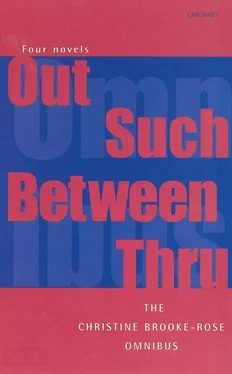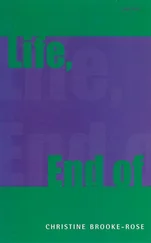— Why now? Why not now? You know the past proves nothing. There’s no such thing as the past, save in the privacy of concupiscence. That’s an article of faith. So stop fretting about how it might have been. Unless of course the urge is too great to be contained. Then go find yourself a whore, a bureaucrat’s willing wife, they’re all willing to reenact you know, regardless of race or creed, so just go ahead and indulge yourselves with post-mortems and forged identities. Go on, go on.
— Why, Lilly, whatever’s the matter?
— He gets on my nerves. And there’s my tin of pineapple gone, for nothing.
— Don’t cry, Lilly. Shall I take him over for a bit? You need a rest.
— Oh, my pineapple!
— But the pineapple was gorgeous, and we had a good laugh, didn’t we? Look, I’ve got a tin of prunes at home I can let you have instead. Oh I know it’s not the same but there’s a lovely recipe on it for prune kebab. He’s a sick man you know.
— I’m perfectly healthy. I do a full day’s work. That’s the test isn’t it? Can he love, can he work?
— Well –
— And if the past proves nothing why do they keep asking about my previous occupation?
— They’re bureaucrats. They’re behind the times.
— What were you before the displacement! What displacement for heaven’s sake?
— The displacement from cause to effect.
— Oh Mrs. Ned! You understand me! Help me, help me.
— Lilly, d’you mind?
— No, I don’t mind. Not if you bring me the prunes.
— My dear, you mustn’t get so worked up. It’s their little weakness, they fed on our past you see, and drained us of its strength, and we feed on their present. Now they deny the past, but need to ask as a matter of form, it flatters them, it’s a relic that they adhere to. We must allow them their little weaknesses.
— Come closer. Tell me, Mrs. Ned, how can you know they fed on it if there’s no such thing as the past?
— There you go again with your sick talk. It’s all a question of adjustment.
— Mrs. Ned, you are full of promise, I want to make mental love to you, here, on the kitchen chair. D’you mind, Lilly?
— No, I don’t mind. I can tell you in advance, though, it won’t help. Don’t forget the prunes.
— Tell me about yourself, Mrs. Ned.
— There’s not much to tell, it’s banal really, I first met my father in the usual circumstances, as a transference, and I said to him, why did you deprive me of my trauma, I’ve been looking for it ever since, alchemising anecdote to legend, episode to myth, it’s exhausting, you’ve made my life a misery, it’s because of you that I’ve grown up deprived, but he didn’t reply. I fell in love with him, deeply, painfully in love. How did you first meet your mother?
— At her funeral. The flowers on her coffin were a mass of red.
— Really? Why, what did she die of?
— In the displacement, you know.
— Go on.
— I can’t.
— What did she say to you?
— She was covered with purple patches. Her eyeballs stuck out. She couldn’t speak, she was deaf and blind.
— Was it the monocytic type?
— No, Chloroma.
— Go on.
— I can’t … Come in.
— Excuse. Boeuf Strongonoff. Wife.
— Well, thank you Mrs. Ivan. But why?
— Cry on tins. Present.
— It’s most kind of you. Lilly will be delighted.
— Please empty to return. Keep for roof. Ivan.
— Certainly. Thank you very much.
— Nichevo. Goodnight. Goodnight Mrs.
— Goodnight Mrs. Ivan.
— Goodnight Mrs. Ivan. Oh dear where were we?
— I don’t know.
— Erm. What did you do, before?
— What do you think I did?
— Something important.
The image of the man grows up a little. The two hands clutch each other damply across the wrinkled wood of the table, which is quite still and unflowing in the dusk. The goitre opposite seems to swell as Mrs. Ned relishes the idea.
— You’re important to me.
— Oh. But who are you? You must make yourself important too, a worthy vessel to contain my importance.
— You must make me a worthy vessel. It takes two to make love.
— Did you ever find your trauma?
— Not really. It got lost, in the displacement, you know.
— What displacement?
— The displacement from cause to effect.
— From birth to death.
— From nothing to something.
— From red to sickly white. Then black.
— From infra-red to ultra-violet.
— You’re beautiful. You’re wonderful.
— That’s why I have this goitre, you see, it’s a deficiency of thyroxin due to emotional deprivation.
— Oh my darling, you are important, you are a worthy vessel.
— What did you do, then, it must have been very important?
— I was a great lover. A lover of society. I grew up with her, grew strong out of her, basked in her. I tickled her, scratched her, tormented her, accused her, I trained the great microscopes of searching questions on her. I despised her, mocked her, got cynical about her, used her. I despaired of her, had high hopes of her, I loved her.
— How wonderful. So you satisfied your own demand?
— Yes, of course. But I was only a cog in her machine and the machine ground to a standstill.
— She let you down?
— Yes.
The image of the man grows up.
— Have you told this to anyone else?
— You are the first person to know.
— That’s nice. Because I’m bound to feel with you. I was let down too. Built up and then let down.
— You’re not doing it right, you’re talking about yourself.
— I’m only explaining that I’m ready as a vessel, and that I’m bound to feel with you, and understand your idealism.
— But I’m a formalist.
— I see. Well, it all comes, I mean, tell me, have you ever been in love, deeply, painfully in love?
— Er … define your terms.
— Needing his, I mean her, interest, I’ll put it no stronger, full-time, deeply, painfully enough to make an abject idiot of yourself getting it, and of course not getting it, on account of the situation, and so losing his, I mean her, interest. If any.
— No, only women do that.
— I am a woman. Have pity. You’re such a wonderful formalist.
The image of the man grows big. His identity is enormous. Identity is a powerful instrument.
— You’re talking about yourself.
— I’ve always loved you. From the very beginning I’ve loved you.
And so on. Lilly was right. Sooner or later smallness returns. Anyone can bluff a metaphysical remark as part of the pretence that the human mind is interesting, and alone involved. But nothing less than symbiosis will do. And in the marbled top-room of the mind, Mrs. Mgulu wears golden shoes. Her head is helmeted in golden chrome. In the left nostril, the alexandrite looks pink in the salon lights. She is reading a book on horticulture, with glossy golden callicarpas on the cover. From time to time she puts it down on her lap and looks a little beyond it to the floor in front of her. Or even to the right of her, keeping her eyes open, which strike deep, a rich chromatic chord. The marbled thermoplastic tiles are purple, streaked with pink. Have you ever been deeply, painfully in love? The answer is no, never. It is possible, after all, to act out these things, to divide oneself and remain whole, despite Mr. Swaminathan’s silent sway as he continues to indwell, sharing the observation of phenomena, staring at Mrs. Mgulu in golden shoes and a helmet of golden chrome. Eating her up. Her dark face shines under the hot air, beautiful in any circumstances, with the alexandrite pink in her left nostril. Mr. Swaminathan holds a black thermoplastic hose that follows his movement like a dying metronome.
Читать дальше












